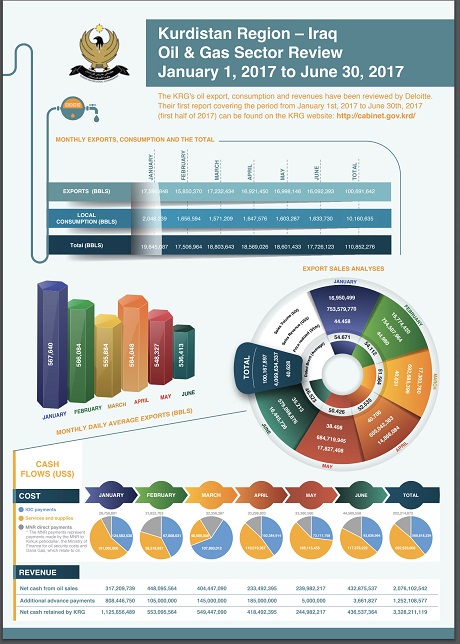ERBIL, Kurdistan Region – The Kurdistan Regional Government brought in over $3 billion in oil sales in the first half of 2017, according to an audit report from Deloitte, released by the government on Tuesday.
The government described the decision to publish the "verified numbers" from one of the world’s largest auditing firms as a step in the right direction towards transparency.
"According to the validated numbers, the total revenue generated from oil sales is 3,328,211,119 US dollars, after deducting expenses," for the period from January 1, 2017 to June 30, 2017, the KRG stated.
The KRG sold oil at an average of $41.29 per barrel, while the average Brent oil price was $51.71.
The KRG signed a contract with Deloitte at the request of the World Bank to audit oil sales and revenues.
The data for the second half of 2017 will be published in the near future, the KRG said, adding it "considers the auditing process as an important step for strengthening transparency in the oil and gas sector of the Kurdistan Region."
"The KRG has approved Deloitte's recommendations to further enhance the processes and address any shortcomings," the statement added.
Deloitte stated in its financial report that they found no "misstatements" of the KRG's oil exports, consumption, or sales over the stated period. The firm will also be auditing oil production and sales for 2014, 2015, and 2016.
The KRG started to export oil in early 2014 through Turkey's Ceyhan port, independent of the government of Iraq.
Baghdad cut the KRG's share of the Iraqi budget in response to Erbil's plans to export oil.
Iraqi Prime Minister Haider al-Abadi criticized the Kurdish oil sales on several occasions, often releasing numbers different from those released by the KRG's Ministry of Natural Resources.
Please click the graphic to see it with high quality




Comments
Rudaw moderates all comments submitted on our website. We welcome comments which are relevant to the article and encourage further discussion about the issues that matter to you. We also welcome constructive criticism about Rudaw.
To be approved for publication, however, your comments must meet our community guidelines.
We will not tolerate the following: profanity, threats, personal attacks, vulgarity, abuse (such as sexism, racism, homophobia or xenophobia), or commercial or personal promotion.
Comments that do not meet our guidelines will be rejected. Comments are not edited – they are either approved or rejected.
Post a comment